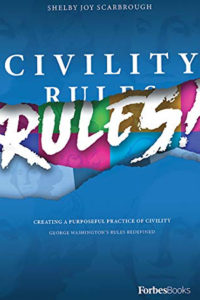
Social media is an incredible technology that carries a lot of benefits to mankind. But it also has this dark side where we beings are given the power of anonymity and impunity – this ability to say things to others that we don’t have to be accountable for. Is civility a dying ideal in these crazy times? Civility Rules! couldn’t have been published in a better time. There is probably no milieu in which the book’s message of resonates more with what’s happening in the world than right now. Its author, Shelby Scarbrough started going through the rabbit hole of civility after years of accumulated experience in public service and the private sector. Her unique take on the topic is something that rings very true in our time and age. Tune in as she gives us snippets of what’s there to learn about civility in this episode of Authoring Life with Alicia Dunams.
—
Listen to the podcast here
Civility Rules!
I’m excited about our guest, Shelby Scarbrough. Shelby began her career in the White House as a member of President Ronald Reagan’s advanced team, where she helped coordinate landmark events such as the Reagan-Gorbachev Moscow Summit. She also served as a Protocol Officer in the US Department of State.
In 1990, Shelby founded the Practical Protocol, a company that plans bespoke events for foreign dignitaries such as Nelson Mandela, Pope John Paul II, and Lech Walesa. Shelby’s experiences in both public service and the private sector have given her a unique insight into the practices that lead to positive relationships and productive communication between individuals, countries, and societies.
Shelby resides in the San Francisco Bay area where she is a speaker, entrepreneur, and writer. We’re going to be jumping in and talking about her book, Civility Rules!. This is where Shelby shares the core ideals of civility and shows how we can gracefully manage even the toughest relationships. What a time for a book like this.
—
Shelby, it’s wonderful to have you here.
It’s great to be here. Thank you so much. I love your intro.
You have quite the experience. The fact that you put on events that bring together world leaders and spiritual leaders, you have a basis to speak into this in terms of civility rules. First, I want to start with the question I start with all my guests. Shelby, why did you write a book?
I was asked to write a chapter for a book a long time ago called The Power of Civility. They asked me if I wanted to write about international civility or political civility. I got into the context of it. I had done so much in the international realm that I thought I’d take on politics. What I realized in all of my research and interviews with people is that political civility is an oxymoron and it doesn’t exist. As I wrote the chapter, I realized that there was a book here.
I spent the next ten years or so picking different things to investigate. I landed on George Washington’s Rules of Civility as an anchor for my book. He took 110 rules of etiquette from a French etiquette book and translated them into English. They think it might have been for a writing exercise or something, but he incorporated some of these into his life. I took all of those 110 rules and analyzed them and figured out what a concept of civility is from that. What visibility is from his 110 rules?
Let’s take Civility Rules!. You shared why you wrote this book. I want to apply it to right now realities of the political sphere because you have that background starting in Ronald Reagan’s White House and the work that you’re doing now. What is going on? How can we apply civility to what’s happening in this age and stage of politics and world affairs?
It’s a crazy time. I used to think, “Is it any worse than it ever was?” It is. I’ve come to believe that social media and some of our wonderful, incredible technologies are amazing and can be beneficial to mankind. It also has this dark side that we, as human beings, are subject to fall prey to, which is anonymity, the ability to say things that we don’t have to be accountable for in some way, or that we think we don’t have to be accountable for.

The information that comes through that may or may not be accurate and not knowing where it’s coming from to be able to validate the accuracy of it. It puts people at odds with one another. Cyberbullying is all these kinds of things that are easy to do for people who haven’t grown up yet and don’t for younger people who sometimes want to take things out on their peers.
That saddens me a lot. There’s all this noise out there that didn’t used to be there. I’m glad I grew up in a day and age that I played outside, climbed in trees, and came home at dinnertime. I feel a little bit bad for the kids these days. I wish that was something that parents would do. It is to make sure that they get their kids outside and play. My courtyard is that way. I listen to the kids during COVID out in my court all the time. It was so much fun to know that they were having that kind of a lifestyle instead of in front of a screen because I think that is a big contributor to some of this incivility.
It’s contributing to an overall decline in terms of mental health and civility as we’re seeing play out on the screens on the TV and social media. What I want to hear from you are some of the lessons in your book. Something that would be applicable now with a run-up to midterms, another presidential election in a couple of years, and the more fear and hate and hate speech that’s out on display. I’m curious about some of your lessons that we could apply now.
As I was writing this, it became apparent to me that it’s easy to point the finger and say that somebody else is being uncivil, but we can’t technically do anything about that. I’m not for legislating civility because I think that that’s not the American way. We need to be responsible for ourselves. One of the things that came out of this was understanding that personal responsibility for our own behavior was super important.

The other is that I call it creating a purposeful practice of civility. It’s something that we need to do all the time. It’s not a switch you turn on or off. It’s a practice, like a doctor practices medicine or a lawyer practices law. They’re constantly learning and iterating. We need to be doing that all the time. It’s paying attention to our own behavior at all times if we want to live in a more civil world because it’s not about the next person. It’s about our own behavior.
We don’t know how other people are going to act. It’s how we respond to that. First of all, you said it’s a legislate civility. It’s our own personal responsibility. What are some lessons that you can support us in learning how to be mindful of how we act out in the world?
The premises that came from the book were when I analyzed all of these rules of civility. They all fell into about 5 or 6 buckets, which is trust, respect, dignity, honor, humility, and courtesy. Those are some of the main points that if we keep those in mind with every action that we take and how we show up in the world, it goes a long way to making the world a better place. How does that come out in actionable movement? Things like listening, simple core concepts and communication, but listening to learn and learn to listen. It’s where the old concept of, “Listen to somebody all the way through. Try to understand where they’re coming from before we jump in and try to counteract it or say yeah, but, or, we don’t agree, or get our own opinion in there.”
If we’re listening to somebody, then we’re honoring them and we’re building respect between them and trust. Are we being trustworthy? Are we being honor-worthy? Am I acting honorable? All of those kinds of things. Every time I open my mouth, I try to say, “Is this acting honorably? Am I living up to my standards here with what I’m about to say?” It’s super easy to get passive-aggressive in something, be sarcastic, and be snippy with somebody when they’ve done something wrong, stolen your parking place, or cut you off in traffic. Even those basic things, give people the benefit of the doubt. Let some of this stuff go because some of it is not worth it. My middle name is Joy so I have a whole thing about joy.
I’ve come to believe that joy and civility are two sides of the same coin in the sense that if you’re not living a joyful life, it’s hard to be civil. Grumpy people aren’t nice sometimes. You can understand it. People are in pain, people who are isolated, people who have maybe mental issues or they’ve got some built-up anger for something, you can see why it might be hard to be joyful. The other side of it is if you’re not civil, then joy is hard to follow and find. It goes both ways, joy and civility. Finding joy and finding civility are great ways to help the other side of that. A happier person is a civil person, I believe. At least I’ve found that in my own experience.
Joy and civility are two sides of the same coin. If you're not living a joyful life, it's hard to be civil. Click To TweetBefore we go any further with the interview, share where people can buy Civility Rules!. Where can people buy it?
Amazon, Barnes & Noble and also, my website, ShelbyJoyScarbrough.com. There’s a copy there. You can get that and a couple of other things that go on, on that website that are fun. A little bit of joy there, too, if you want to know more about that. They can go there.
You shared that you have another book that is a family book. I’d love for you to share a little bit about that and how that works with the work that you do in the world and your moving forward with the concept of civility.
My grandfather was a pioneer aviator. He was the first to attempt to fly solo around the world. My cousins and my sisters and I got together and published a book called Undaunted. It’s about his life story. His life story is fascinating. I had the good fortune of meeting my grandfather. I knew him until I was 28 years old. He passed away when I was 28. I spent a lot of time with him.
He was a fascinating man. He accomplished so much in his life and many firsts in flight. One good visual is his pilot’s license was signed by Orville Wright himself. It went to the moon with Neil Armstrong and Buzz Aldrin and was signed by them. His pilot’s license represents this whole span of aviation technology and the whole aviation field that we all take for granted these days.
Some of the great lessons that I learned from getting this book out and wanting to share his legacy with the world was the perseverance that it takes to accomplish great things that he didn’t give up. He probably, if he had applied for it, have the Guinness World record for the man who survived the most amount of plane crashes. He crashed more than anybody I know, but he kept getting back up and getting literally back in the cockpit and going again. Some of his accomplishments are all the more amazing because of the failures that accompany them.
A distinction of leadership is falling down and getting back up. The same thing to Civility Rules!. I’m curious, you like to keep things from a 30,000-point view to look at the world and what’s going on. Who would you see as great examples in terms of leadership and civility that we could aspire to be like?
I go automatically to my first boss. Essentially, my first boss was Ronald Reagan. Unfortunately, he’s long gone, but he was such a model of civility. He was a great man in that sense. He respected everybody and all opinions. He treated everybody with dignity and respect. He carried himself honorably and humbly, which is a big part of leadership. It’s also a great part of civility because if we have humility, we understand that we don’t know everything.
We’re not amoebas. We have enough confidence to know that we have an opinion, a viewpoint, or a perspective on the world, but it isn’t the only one. There are other ways to look at the world. A key in civility is understanding that we may be convicted about our position on something, but there is always another way to look at it. If we can accept that and honor that in someone else, we can make great strides in civility.
How was it to host Nelson Mandela? What are some of the lessons that you learned from him in that experience?
Again, humility stands out as number one. He was gracious. I had a brief time with him. It was only a few days, but a few days more than most people. It was such a beautiful experience because he had just gotten out of prison and was coming to the United States. This was before he was president. He’d been in prison for 27 years or something. You would never know that. You never saw anger and frustration. I only saw patience, grace, kindness, and helpfulness. His wife at the time was Winnie Mandela. She had a box with a headdress, a piece that she was going to wear to the White House and it got misplaced in the hotel.
I was going to go look for it but off we all went to go look for it. That funny to me because it’s not something you expect out of a, at that time, not a world leader, but out of somebody of that stature that they were going to go into the basement of a hotel and look for the box. He was gracious, kind, and humble, and managed to, in my mind, get past what could obviously be a horrific time and move past it to do great things.
Obviously, Ronald Reagan and Nelson Mandela have passed. Do you have any examples of leaders that embrace civility?
Not too many, to be honest. It’s unfortunate. Circling back to personal practice, it’s up to us. I’d like to see leaders in government and life as examples of people with great civility but there’s not too many. A couple of different people in business would be Peter Diamandis and Keith Ferrazzi. These are both people I know personally. They both carry themselves with grace, kindness towards others, and patience. They have abundant knowledge, experience, and wisdom, but they are big-time learners. A big key is being open to learning new things. That helps people keep an open mind.

Thank you for sharing that. With that, we will go into our lightning round. You’ll mention the first thing that comes to your mind. The first one is, what is your legacy?
As much as I love the civility context, to me, I’d love to pass that on and have people embrace that and pass it forward. I also would like to know that people live a joyful life. Those two things, civility and joy, are the things that I would love to be known for and to know that people say when I’m gone, “She was a civil person. She helped other people see the world in a different light. She brought joy wherever she went.” That would be a nice legacy.
Your favorite book?
I’m going to go with these two, Undaunted and Civility Rules!. I have to. To be honest, Undaunted is fun because it’s written like a novel. It reads like a novel like it’s not true and every word is true except maybe a dialogue piece or two because we had to make it up in a couple of places where we thought we needed more dialogue. In general, every action and activity that happened is all true, and yet it reads like a great adventure story.
Your favorite author?
The first one that came to mind is James Michener, although I love a lot of different authors. Why he came to mind? I have to think about it. It is because I read the book, Hawaii. It was my first book when I was in eighth grade or something like that. I loved his descriptions. I thought he was a great weaver of a story. He was able to sustain interest for a long time and get you into the details of different cultures and different places.
What are you reading next?
I’m a tech nerd. I read a lot of stuff about technology. This isn’t heavy-duty reading, but it’s a newsletter called Product Hunt. Anybody who’s a tech geek like me will love all the stuff that’s coming out on it. I get a daily update. It’s one of the few things I read every day. It tells me all sorts of cool new apps and Software as a Service and things to better your life.
What are you writing next?
I’m writing a book about my great-grandmother. It’s almost done. I have to finish getting the pictures in. It’s her biography that she handwrote on 300 legal pages back-to-back. She wrote it twice. One for her daughter, my grandmother, and one for my great-uncle, her son. She hand-wrote it. She had arthritis and still had beautiful handwriting. I’ve taken all that story, which goes through from the horse and buggy era to the space age. She was like Forest Gump. She was everywhere in all of these things and had a famous son-in-law, daughter, and son.
All of these things that went along with that. She saw many amazing things. She was this little teeny sweet old lady when I knew her and meek and mild. She didn’t sit around talking about her opinion but this writing tells these documents, the changes in history, and the things that she saw. I’m interspersing all of the historical elements that took place during her life so that we can put them in context. It’s been a fun project.
What an interesting family you come from. There’s a wealth of content and stories there.
Can we go all the way back to the main floor? There are probably a few stories in that family that I haven’t touched yet.
Where can people find out more about you, what you have to offer, and how you serve the world?
ShelbyJoyScarbrough.com is a good place. I have a website called JoyJourney.life that’s fun. That has a lot of fun eCommerce things, jewelry, and bags that have either has joy written on it or it was joyful to me. It’s on there for that reason. There’s a lot of history there about I’m an entrepreneur and I believe in entrepreneurship. I highlight the people who’ve made some of these products that are on my site to help their businesses along and small business owners and things like that. That’s a fun place to go.
Any social media handles we should know.
@ShelbyJoy at Twitter. I’m on LinkedIn under Practical Protocol. You can find me at Shelby Scarbrough and Shelby Joy Scarbrough on Facebook.
I’d love to hear from you one last piece of advice or wisdom that you would like to share with our audience at home from your book or life lesson that you personally would want to share with them.
Between Civility and Undaunted, I think of the two things there is fortitude and perseverance to achieve your goals. If you want to see a more civil world, I like to think that we have to keep trying. We have to not let the interference of all the noise in this world get in our way and get us down. Let’s keep going and be the change. To quote Gandhi, “To be the change, we wish to see in the world.”
If we want to see a more civil world, we have to keep trying. We need to not let all the noise in this world get in our way and get us down. Let's keep going and be the change. Click To TweetWhat a wonderful way to close out this episode. It’s been so great to have you and interview you. Everyone, please go out and purchase Civility Rules! and Undaunted. You can find them on Amazon, your local bookstore, and Barnes & Noble. Please, go and support Shelby and spread civility in this world. It starts with us. Thank you so much, Shelby.
You’re so fun. Thank you so much for having me.
Everyone, be well. We’ll see you next time on our next episode.
Important Links
- Shelby Scarbrough
- Civility Rules!
- The Power of Civility
- George Washington’s Rules of Civility
- Barnes & Noble – Civility Rules!
- Undaunted
- Hawaii
- JoyJourney.life
- @ShelbyJoy – Twitter
- Practical Protocol – LinkedIn
- Shelby Scarbrough – Facebook
- Product Hunt
About Shelby Scarbrough
 Shelby Scarbrough began her career in the White House as a member of Pres. Ronald Regan’s advance team, where she helped coordinate such landmark events as the Reagan-Gorbachev Moscow Summit. She then served as a protocol officer in the U.S. Department of State. In 1990, Shelby founded Practical Protocol, LLC, a company that plans bespoke events for foreign dignitaries such as Nelson Mandela, Pope John Paul II, and Lech Walesa. Shelby’s experiences in both public service and the private sector have given her a unique insight into the practices that lead to positive relationships and productive communication between individuals, countries, and societies. Shelby resides in the San Francisco Bay Area, where she is a speaker, entrepreneur, and writer.
Shelby Scarbrough began her career in the White House as a member of Pres. Ronald Regan’s advance team, where she helped coordinate such landmark events as the Reagan-Gorbachev Moscow Summit. She then served as a protocol officer in the U.S. Department of State. In 1990, Shelby founded Practical Protocol, LLC, a company that plans bespoke events for foreign dignitaries such as Nelson Mandela, Pope John Paul II, and Lech Walesa. Shelby’s experiences in both public service and the private sector have given her a unique insight into the practices that lead to positive relationships and productive communication between individuals, countries, and societies. Shelby resides in the San Francisco Bay Area, where she is a speaker, entrepreneur, and writer.
Book Description: Civility Rules! Scarbrough shares the core ideals of civility and shows how we can gracefully manage even the toughest relationships.
Love the show? Subscribe, rate, review, and share! http://aliciadunams.com/
